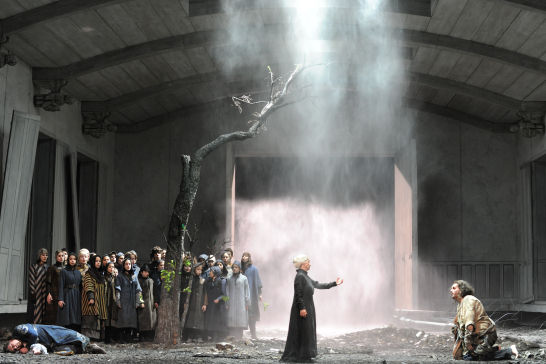Other Links
Editorial Board
-
Editor - Bill Kenny
-
Deputy Editor - Bob Briggs
Founder - Len Mullenger
Google Site Search
SEEN
AND HEARD INTERNATIONAL OPERA REVIEW
Wagner,
Tannhäuser:
Soloists,
Orchestra and Chorus of Greek National Opera /
Philippe Auguin (conductor) Athens Concert Hall,
24.1.2009 (BM)

Picture © Stefanos
It was the hustle and bustle of the opera’s great
ensemble scenes that brought this staging together.
However, unlike a Zefirelli production, they
refrained from burdening the naked eye with more than
it can take in. All this was achieved against the
backdrop of an extremely versatile set (also by Paul
Brown), in the center of which stood a tree, green
and leafy in the first act, barren in the second and
charred in the third, but then sprouting fresh shoots
(the Pope has decreed that he can no more grant
Tannhäuser absolution than green leaves can grow on
his staff). And the superb finale assured us that we
fallible humans are entitled to kindness, peace,
honor, hope and care - the words painted in red on a
row of young choristers’ chests.
Of course none of these ideas could have been
conveyed so strongly without the involvement of many
excellent musicians, and here the ensembles were
rather more exciting than the soloists. Under
Philippe Auguin, Greek National Opera’s orchestra
played well beyond its means, a long-awaited
opportunity for it to show what it can achieve when
motivated to do so. Nikos Vassiliou’s GNO Chorus rose
to the occasion, contributing spellbinding moments,
along with the Rosarte Children’s Choir, making its
debut at the Megaron and impressive in volume and
accuracy. John Treleaven did a dignified, if not
thrilling job with his title role, but many of us
have heard him in more breathtaking form, so I will
not dwell on that. Since one of the original cast
members left the production in a huff about a month
ago, Lise Lindstrom was called upon to sing both
Elisabeth (with exhilarating top notes) and Venus
(who could have done with a somewhat more mellow
tone, but how much can you ask of one and the same
person?), resulting in a well-earned standing
ovation. Of their co-stars, Martin Snell as Herrmann,
Rolf Haunstein as Bitterolf and John Horton Murray as
Walther von der Vogelweide deserve to be mentioned,
as well as baritone Ashley Holland’s somewhat
idiosyncratic Wolfram, who was quite convincing in
voice and character.
It’s hardly news that you don’t need to go to
Bayreuth to see good Wagner, but nonetheless this was
an utterly unexpected treat for the city of Athens.
No one knows how GNO managed to pull this production
off despite its notoriously limited means, so one can
only hope they will do it again soon. And if, to
quote Graham Vick, ‘opera needs to change’ to reach
new audiences and remain viable – and it does – then
this is most definitely the direction it should be
going in.
Bettina Mara
Back
to Top
Cumulative Index Page
